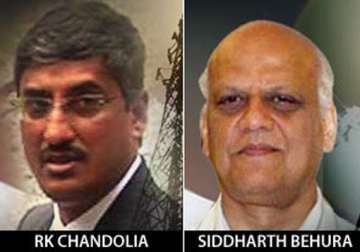New Delhi, Jan 2 : The Supreme Court today agreed to hear the bail petitions of A Raja's former Private Secretary R K Chandolia and former Telecom Secretary Siddharth Behura, accused in the 2G spectrum case, and issued notice to CBI on their pleas.
A bench headed by Justice G S Singhvi also extended the interim stay on the Delhi High Court's order which had put on hold the bail granted to Chandolia by the trial court.
With today's order Chandolia, who was granted bail by the trial court, will remain out of jail till the next date of hearing.
Out of the 14 accused persons, 12 have already been granted bail and only the prime accused, former telecom minister A Raja and Behura are left behind the bars.
The bench had agreed to examine Chandolia's plea against the high court's suo-motu decision to stay the grant of bail to him by the special court on December 1, 2011 and was released from Tihar Jail the same day.
Chandolia had moved the apex court, challenging the high court order saying its decision of staying the bail was “unwarranted and erroneous”.
Behura had approached the apex court challenging the December 16, 2011 order of the high court denying him bail on the ground that he was the “perpetrator” of the illegal design of Raja and cannot claim benefit of parity with 10 others released on bail.
The high court bench of Justice V K Shali had taken suo-motu cognisance of news reports on grant of bail to Chandolia and suspended it, saying the stay would be operative if he was not already out of jail.
The high court had said Chandolia's release would have an “impact” on Behura's bail plea, on which the verdict was reserved. Later on, Behura was denied bail by the high court.
The apex court had on December 7, 2011 put on hold the high court's suo-moto decision of staying grant of bail to Chandolia.
Denying bail to Behura, who was arrested along with Raja on February 2 last year, the high court had said,
“One thing, which emerges from their (witnesses) statements, is very clear that the petitioner (Behura) has been a perpetrator of illegal design of Raja and, therefore, his role was distinguishable from 10 accused who have been granted bail and were beneficiary of that illegal act.”
It had said Behura cannot claim benefit of parity with others “merely without any application of mind by the court” as he being a public servant was required to act differently.
The nature of evidence against Behura was “very serious” and if offences were proved, it would entail life term under section 409 (criminal breach of trust) of the IPC, it had said.
The high court had said that if Raja can be said as the kingpin of the case then Behura and Chandolia (ex-aide of Raja) acted as a “propeller” in committing the offence. It had also said that public servants Raja, Behura and Chandolia conspired and acted to grant benefits to telecom companies.
Latest India News
